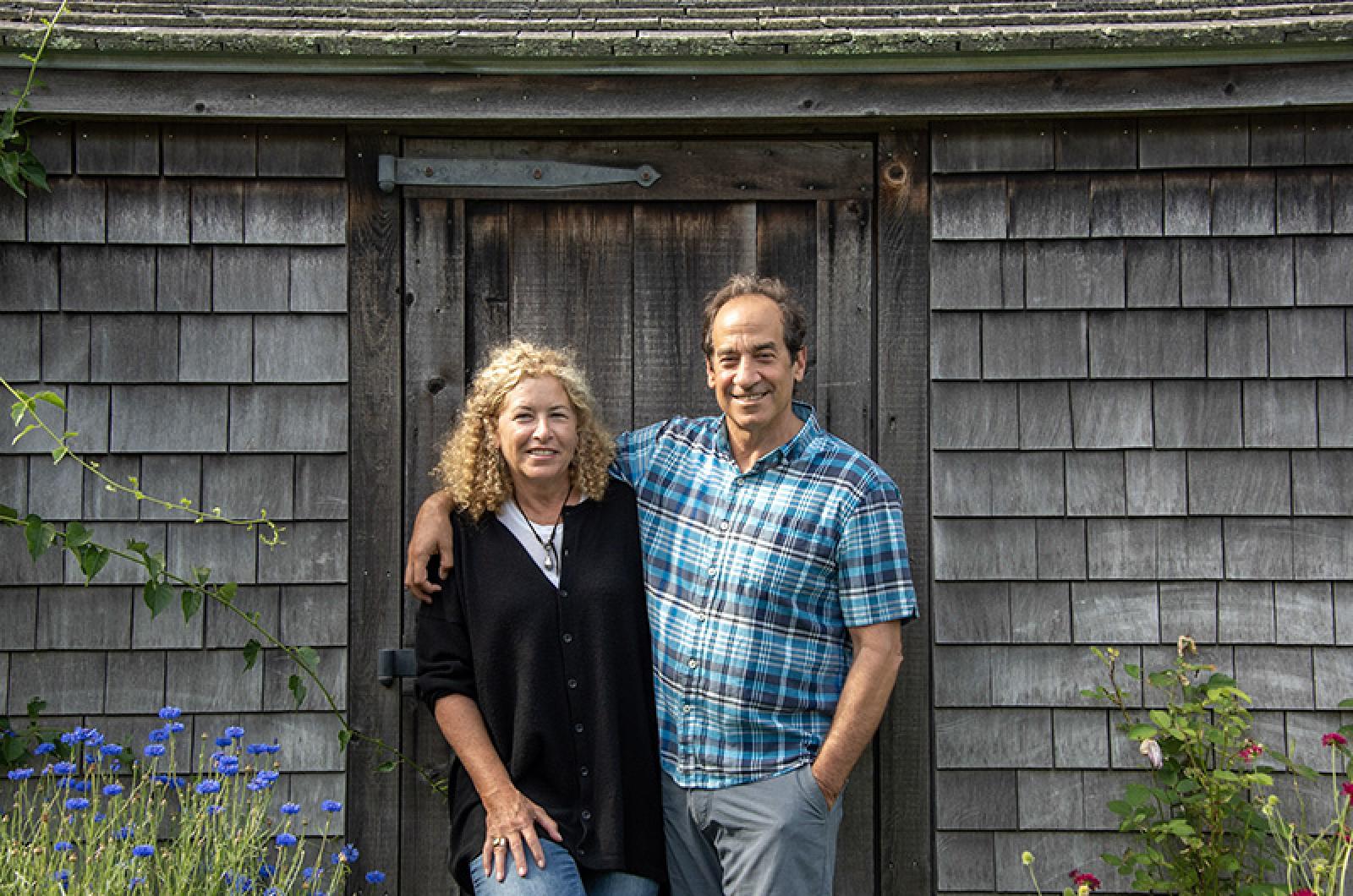Betsy and Jesse Fink know the power of a seed. The two philanthropists met in forestry school. They owned and operated a farm in Wilton, Conn., for 11 years, starting with vegetables and expanding to laying hens, broiler chickens, pigs and sheep.
They’ve also cultivated ideas, growing them and nurturing them until they become forces in the world. They have visited the Vineyard regularly since 1995 and now own a home in Katama.
On the Island, they are the primary financial supporters of the Martha’s Vineyard Food Waste Initiative, a project affiliated with the Island Grown Initiative with a goal of reducing food waste on the Island by 50 per cent by 2030. “We like to test things, start things,” Ms. Fink said, sitting on their back porch overlooking Katama Bay with Mr. Fink and their aged yellow lab, Milo. Both were part of the founding team of the online travel company Priceline in the 1990s — Mr. Fink as the co-founding chief operating officer, and Ms. Fink as a systems project manager. After they left the company, they established a family foundation and an impact investing firm called Mission Point Partners. They also bought and operated Millstone Farm in Wilton from 2005 to 2016.
They are still avid gardeners, and it was through their farm that the Finks first began to become aware of the issue of food waste. Ms. Fink said when she was delivering produce from the farm to restaurants and markets, she saw just how much food was regularly being thrown away.
“It was just very interesting to see all the produce going out the back door,” she said. “So we just started saying, Hey, do you mind if we take that?” She knew the food could be used to feed animals or for compost. “We left bins for them. Every time we delivered, we would take the waste.”
They began to offer educational programs on the farm for people who wanted to grow organically, to compost and raise chickens. They started a conversation with other food recovery organizations, convening leaders of multiple initiatives from around the country together to talk about their efforts.
“We created big tent forum,” Mr. Fink said. As they discussed their different local approaches, Mr. Fink realized there seemed to be a lack of baseline data. “It was really great work, but I think we looked at it and said collectively what are we doing? And really, how do you solve food waste?” Mr. Fink recalled.
To answer those questions, they founded a nonprofit think tank called ReFED to develop a roadmap for reducing food waste nationally by 20 per cent. Researchers at ReFED used data to identify inefficiencies and bottlenecks in the food distribution system. After two years of analysis, they published an action plan with specific, large-scale suggested changes. The solution, according to the report, will require billions of dollars, widespread policy changes and new technology and innovation.
But knowing the power of a seed, the Finks have set their sights on the Vineyard as a pilot.
“The roadmap says here’s how you do it, and then Betsy and I said, okay that’s great, but how do you actually put it into action. And that’s why we’ve gone local again,” Mr. Fink said.
This year, they made possible the purchase of an in-vessel composter and a food recovery truck for IGI’s pilot program, which works with all the Island landfills and nearly 40 local businesses. The group expects to process 360 tons of waste this year, feeding salvageable food to people or animals, and turning the rest into compost.
The Finks have also invested in people through internships and fellowships, including funding the position of the food waste initiative project director Eunice Yeomans.
“My interest is on the human capital side so I get very excited about the people involved,” Mr. Fink said.
Other local pilot programs include one near the family’s other home in Colorado with the Eagle River Valley Food Bank and additional efforts in the border town of Nogales, Ariz., a first destination for food being imported from Mexico.
Ms. Fink said depending on demand and food prices, whole trucks sometimes do not make it beyond distributors in Nogales to stores.
“We literally watched tractor trailers full of food being dumped in the landfill,” Ms. Fink said.
ReFED found that annually, food waste in the U.S. totals 63 million tons. An overwhelming number, but the Finks remain undaunted.
“I think we’re moving in the right direction,” Ms. Fink said. “People are listening. People are hearing it. People are paying attention.”








Comments (3)
Comments
Comment policy »